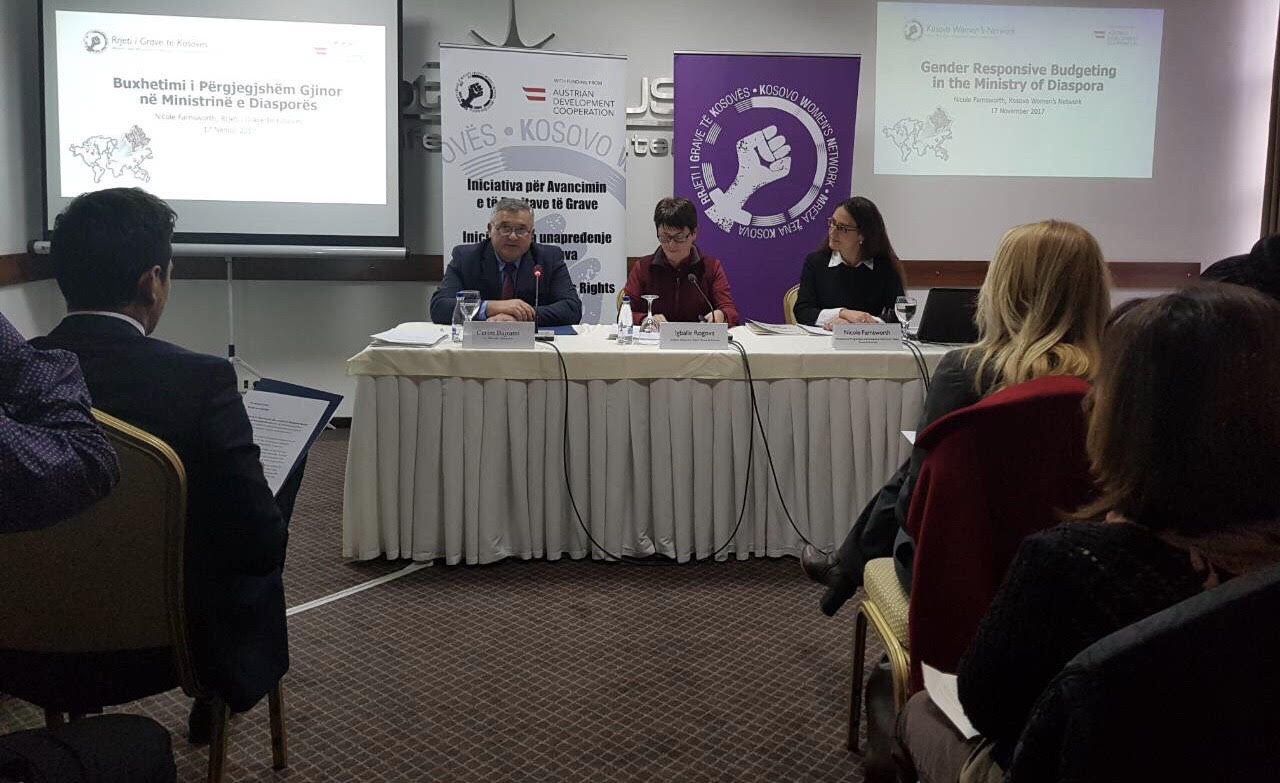Often times, women, men, girls and boys have various needs and priorities. Diaspora policies and programs must consider such differences. The Gender Responsive Budgeting (GRB) includes integrating gender in all the stages of planning, implementation, monitoring and assessment of state budgets.
In Kosovo, all budget organizations are legally bound to perform a GRB in order to advance the gender equality and better fulfil the needs of various citizens. Carrying out the gender analysis is the first essential step towards informing GRB.
For this reason, the Ministry of Diaspora (MD) and the Kosovo Women’sNetwork (KWN) have cooperated closely in order to carry out this gender analysis towards identifying the specific objectives and activities for furthering the gender equality in the operations of the Ministry.
- Some MD departments and bodies do not have gender-segregated data or systems for maintaining and using such data for budget planning. The Ministry should ensure that the employees gather, maintain and use gender-segregated data about the targeted persons, persons receiving consultation and those who benefit from MD programs, in order to improve the input data for planning future expenditures.
- Except for this report, the Ministry has not carried out any known gender analysis to gather data for drafting or analyzing laws, policies or existing strategies related to diaspora. The Ministry should carry out gender analysis to obtain data that will inform drafting of laws, policies, strategies, programs and action plans, analyzing the way the latter impact differently men and women. The Ministry must ensure that the Gender Equality Officer (GEO) participates in working groups.
- As of May 2017, women constituted only 23% of all beneficiaries of subsidies and transfer category and received only 20% of expenses (less than EUR 22,000 out of EUR 110,000), MD must take affirmative actions to increase the share of subsidies and grants benefiting women.
- The procurement processes did not include affirmative actions towards furthering gender equality, as stipulated by the amended Law on Public Procurement. The Public Procurement Division can increase the inclusion of social objectives related to gender equality, under contracts, thereby obliging the contractors to apply the measures designed to promote gender equality when implementing their contracts.
- More men than women have availed themselves of the opportunity for Diaspora students to carry out internships in various ministries. Women constitute 35% of all the interns during 2015-2017.
- The Department for Protection and Cultivation of Education and Culture in Diaspora may use affirmative measures to encourage more men to participate in internship programs.
- More women (60%) than men (40%) participated in trainings held during 2015 and March 2017. Unless these affirmative measures aim at advancing women in career, MD must consider a more balanced participation in trainings from women and men.
- In April 2017, 37% of MD employees were women and 63% men. In 2016, men received 70% of expenditures for salaries and wages. More men (81%) than women (19%) have continuously worked at decisionmaking and better paid levels. MD must use affirmative measures to employ and promote more qualified women, thus contributing to more balanced expenditures in the salaries and wages economic category.
- Women participated in 20% of official travels out of the total official travels in 2016.
- As a result, the women officials received only 15% of expenditures for official travels. MD must ensure a gender balance among its staff that participate in official travel.







